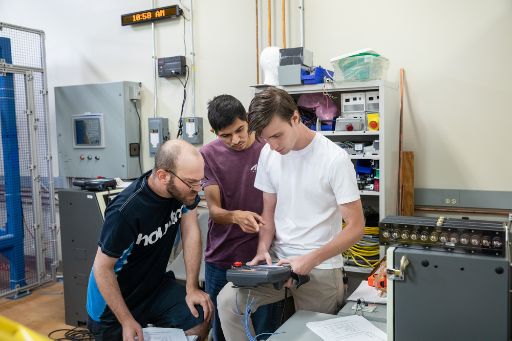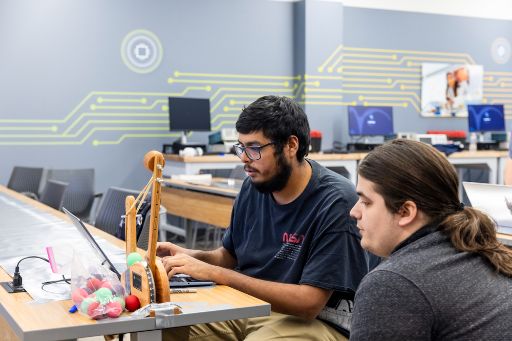The manufacturing industry has always relied on a skilled workforce, and there’s no greater need for highly-trained workers than in the advanced manufacturing sector.
Advanced manufacturing relies on technology such as robotics, machine learning, and electronics in state-of-the-art factories, and workers who know how to program these machines are in high demand.
Austin Community College’s advanced manufacturing program takes students from the classroom to the factory floor in as little as six to eight weeks. Students who want more can get a certificate, associate degree, or bachelor’s degree in applied technology.
If you want to skill up fast in a high-demand career field, then read on to learn more about advanced manufacturing.
In this Article
Advanced Manufacturing and New Collar Jobs
The need for highly-skilled manufacturing workers is greater than ever, because of a shortage of employees in Central Texas and nationally with training and experience. The machines used in an advanced manufacturing plant require highly-skilled employees who know robotics, machine control languages, HMI (human-machine interface), electronics and circuitry, and more.

These jobs have a name – “new collar.” New collar jobs are so new that they require a different education model, one that gets workers up and running fast. This training bypasses the typical four-year college degree and focuses on skills like machine learning, HMI programming, logistics, and more.
New collar training programs may also be customized to specific employer needs, so that manufacturers can be confident that employees have the skills they need to be effective workers in the semiconductor clean room or on the factory floor.
How Do I Get an Advanced Manufacturing Job?
Getting a job in a state-of-the-art factory is a matter of accessing the right training. You may start by getting certified to work on a factory floor, and take an entry-level job that will have you earning right away. These certifications are only the beginning.
ACC’s advanced manufacturing training lets students build on their certifications, from entry-level to a bachelor’s degree. The program is designed to get students into jobs fast, and then combine their classroom and work experience as they move up in skills and experience.
One of the most important advantages of training at a community college is the connection with local industries and employers. At ACC, the semiconductor manufacturing program is interconnected with major conglomerates (Samsung, Applied Materials, NXP) as well as small companies that are just as agile and innovative.
Here are some of the training programs at ACC that can help a student get an advanced manufacturing job.
P-TECH and the Manufacturing Academy for High School Students
ACC’s P-TECH (Pathways in Technology Early College High Schools) program prepares high schoolers for entry-level jobs in manufacturing and other careers and also helps them get a jumpstart on their associate degree. Similarly, the manufacturing academy prepares high schoolers for jobs as entry-level technicians in a plant or factory.
Students learn skills including circuitry, technical drawing, computer-aided manufacturing, and programmable logic controller language training.
This training can also be used as the basis for an associate degree in engineering technology, applied technology, or related degree.
Upskill Training (Rapid Non-Credit Skills Training)
Combining work experience with classroom education can be a great way to boost your career. Employees who want to add to their current knowledge and experience often choose to upskill. Depending on your goals, you can expand your knowledge base and improve your career options with these training courses.
ACC’s Core Advanced Manufacturing and Semiconductor Training (CAST) offers basic and intermediate electronics, industrial sensors, robotics, pneumatics and schematics, and more.
Occupational Skills Award
The occupational skills award (OSA) is a one-semester program that covers automated manufacturing, manufacturing processes, and DC circuits. These classes prepare students for the workplace, but perhaps most importantly, these classes apply toward an advanced manufacturing associate degree.
Associate Degree in Advanced Manufacturing
Depending on your interests, ACC offers several specializations for an associate degree in manufacturing. Students can choose from automation and robotics, engineering technician, or advanced manufacturing.
Why get an associate degree in manufacturing? Students with an associate degree often earn higher wages and are eligible for technician positions that can lead to supervisory jobs. An associate degree is also the first step toward a bachelor’s degree, which also can increase wages.
Bachelor’s Degree in Applied Technology (BAT)
New collar skills training prepares you for a good-paying job in a manufacturing setting and provides a foundation for additional education and work opportunities. Taking that next step – a bachelor’s degree – can prepare you for a long-term career. A BAT is unique because it combines classroom and work experience, builds on your technical knowledge, and prepares you to take a leadership role and understand high tech manufacturing on a broader scale.
Building on the associate degree coursework, you’ll take classes in continuous improvement methods, supply chain management, solid state devices, electrical, electronic, and fluid schematics, and more. Students will also do a senior project and an internship.
All of these classes, plus your own work experience, can help set you up for a career in an advanced technology factory and keep you on the cutting edge of technology.
Meet Eddie, a BAT Student at ACC
After five years in a manufacturing job, ACC student Eddie A. knew he needed to do something different to get to the next level in his career. He started as an apprentice with Samsung and then stacked those credentials onto his associate degree, which earned in 2020.
“My counselors were the biggest resource I used as they helped me set a pathway that would not only fall in line with the degree I wanted to work for but also get the experience I needed to succeed in that career field. I was fortunate to work alongside faculty in the Advanced Manufacturing Department on my path toward my associate and bachelor’s. It was very easy and straightforward.” – Eddie A.
Now in the BAT program, Eddie graduated in 2024 with a degree that will propel his career to even greater heights. “My long-term career goals are learning more about manufacturing and being able to use my experience and knowledge in the engineering field,” Eddie says.

“My counselors were the biggest resource I used as they helped me set a pathway that would not only fall in line with the degree I wanted to work for but also get the experience I needed to succeed in that career field. I was fortunate to work alongside faculty in the Advanced Manufacturing Department on my path toward my associate and bachelor’s. It was very easy and straightforward.”
– Eddie A.
New Collar Job Skills
What does it mean to be a new collar worker? For decades companies in all sectors have chosen to hire college-educated employees. However, large corporations including IBM and drugmaker Merck have turned to skills-based hiring, in which they hire workers who have skills training rather than a traditional bachelor’s degree. These new collar jobs allow companies to staff up quickly, and they also let workers grow in their careers, acquiring new knowledge they can add to their work experience.
So what are some of the new collar job skills that can lead to success?
New Collar Hard Skills
Advanced manufacturing new collar jobs require specific workplace training. These skills include:
- Robotics, machine learning, and controller logic. Factories employ robots. New collar workers need to know how to give robots instructions and troubleshoot when things go wrong.
- Artificial intelligence. Companies use AI for all sorts of surprising tasks, including data analysis, chatbots and scheduling, and more.
- Additive manufacturing and 3D printing. A 3D printer deposits materials layers at a time to build up a product.
- Internet of Things. IoT is the process by which individual machines are networked with one another, sending information back and forth.
- Data management. Modern manufacturing facilities generate vast quantities of data that need to be captured, assessed, analyzed, and stored in a way that supports company requirements.
New Collar Soft Skills
New collar training supports workers’ career goals. The following are some essential interpersonal skills that work in tandem with technical training to give workers an edge.
- Communication. Communication is key, both verbal and written. You may have to write pass-down notes, train a new employee, or report to a supervisor or manager on a workplace concern.
- Critical thinking. You should be able to understand and interpret facts and data based on your experience and training.
- Collaboration. The flow of ideas between coworkers can help solve problems and roadblocks, improve decision making, and make processes more efficient.
- Attention to detail. Often workers need to make precise measurements and keep detailed records.
Advanced Manufacturing Jobs and Salaries
Here are some manufacturing jobs that you can get that start out as entry-level and let you move up as you add to your skills and experience. They usually require an associate degree and work training, such as an internship or entry-level machine operator.
Maintenance Technician
Maintenance techs maintain, diagnose, and repair factory equipment. They must be trained in equipment operation, know how to read blueprints, be able to weld, and understand computer programming controls for finely calibrated machinery. According to the Bureau of Labor Statistics (BLS), the mean hourly wage for maintenance techs was $30.67 in 2024.
Process Technician
A process technician is also known as an industrial engineering technician. Process techs analyze plant workflows, operations, and factory floor layouts. They need to have training in CAD/CAM, industrial technology, quality assurance, supply chain management, and more. According to the BLS, process technicians earned a mean wage of just over $31 per hour in 2024.
Manufacturing Technician
Manufacturing technicians are also known as mechanical engineering technicians. They are responsible for the installation and setup of manufacturing equipment. Manufacturing techs have to understand how each machine is supposed to run so they can maintain each piece of machinery and troubleshoot issues. Skills include operating machinery and problem-solving. Manufacturing techs earned an hourly mean wage of $33.04 in 2024 according to BLS.
Engineering Technician
Engineering techs support engineers by taking on practical tasks such as equipment installation, maintenance, and troubleshooting. Engineering techs can also prepare reports, help figure out production issues, and increase efficiencies on the shop floor. They need a solid understanding of math and know how to read schematics and blueprints. An engineering technician made a mean hourly wage of $31.15 in 2024.
Electronics Technician
Electronics techs are responsible for product testing. They use electronic and electrical testing devices to monitor, adjust, and repair equipment such as monitoring devices, communications equipment, optical equipment, and more. These techs often work in product evaluation and testing, using measuring and diagnostic devices to test, calibrate, and repair equipment. They are also involved in assembling equipment for automation. They may replace circuitry and electrical components, record data, and produce reports. The hourly mean wage for electronic technician was $37.11 in 2024, according to the BLS.
Prepare for a Manufacturing Career at ACC
The demand for highly-skilled advanced manufacturing workers continues to grow in Central Texas. These new collar jobs can pay a family-sustaining wage and provide opportunities to expand your knowledge and skills. If the idea of working with state-of-the-art technology excites you, explore ACC’s advanced manufacturing degree and certificate programs and discover how you can move your career forward.
Tags: advanced manufacturing jobs
Back to Top

